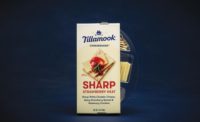More Restaurants Feature Plant-Based Milk Options on the Menu
Fluid Situation: Many leading restaurant chains are jumping on the plant-based bandwagon when it comes to milk alternatives

Plant-based milk alternatives have been around for many decades. Primarily, they’ve come in the form of soy and almond milks and have been mostly consumed by a “crunchy” crowd of consumers. In the past few years, however, retailers and restaurants alike have seen a swift rise in nut milks, coconut milk and most recently, oat milk. These growing options are all tied into greater consumer demand for plant-based alternatives.
Many of the leading restaurant chains are only just now jumping on the plant-based bandwagon when it comes to milk alternatives. These operators are rolling them out quickly across several parts of the beverage menu—particularly as ingredient options in cocktails, smoothies, coffees and espresso-based drinks. Mintel research shows that there has been a +208% increase in the number of menu mentions of oat milk and +133% increase in almond milk mentions from the fourth quarter of 2016 to the fourth quarter of 2019.
More Milks, Millennials
Look for more restaurants to follow retail’s lead and offer pea and sesame seed milk options on the menu. Coffee chain Collectivo Coffee has created a cold brew horchata that is Session Cold Brew with oat milk, cinnamon and vanilla syrup. Restaurant chain P.F. Chang’s created the Coconut Cooler, which includes coconut milk, coconut water, pure cane sugar and nutmeg. Starbucks added coconut milk to its menu in 2015 and almond milk in 2016. In early 2020, the chain rolled out two new drinks with these ingredients, the Almondmilk Honey Flat White and Coconutmilk Latte.
While Gen Zs (ages 13-25) and Millennials (ages 26-43) overall tend to drive consumption of plant-based milk alternatives, Millennials, in particular, tend to drive consumption of the widest variety of them, including coconut, oat, rice and banana milk. Interestingly however, Gen Zs tend to be equally as engaged with flavored non-dairy milks.
Restaurants can appeal to influential young consumers with a variety of plant-based milk options by using products that are now in the consumer packaged goods market. CPG manufacturers have been at the forefront of plant-based milk innovation.
Examples of brands creating innovative products include Ripple, a turmeric and chai flavored plant-based milk from Ripple Foods PBC, Berkeley, Calif. It features turmeric and Ripptein, a pea-based protein. Hope & Sesame LLC, Chicago, has a chocolate flavored organic sesame milk made with organic plant-based Sesamein sesame protein blend. It’s free from gluten, soy, tree nuts, GMOs, lactose and dairy. Yet another interesting new option is an Unsweetened Vanilla Übermilk from Califia Farms LP, Los Angeles. The product contains 8g plant protein, all eight essential amino acids and a complementary blend of oat, pea and sunflower proteins.
Plant The Flag! Starbucks Expands Plant-Based Beverage Offerings

Starbucks Almondmilk Honey Flat White. PHOTO COURTESY OF: STARBUCKS CORP. (WWW.STARBUCKS.COM)
Starbucks Corp. greeted 2020 with three new plant-based beverages, which are some of its first dairy alternative options since 1997, when it debuted a soy chai tea latte and soy cappuccino.
The first new Starbucks beverages of the decade feature these plant-based milk alternatives with the arrival of the Almondmilk Honey Flat White and Coconutmilk Latte. The beverages joined the permanent menu in stores in the United States and Canada starting January 7 as part of a new winter food and beverage lineup. In conjunction, Starbucks introduced a regional Oatmilk Honey Latte arrives in select U.S. markets in the Midwest.
In an online news release, Starbucks Communications Program Manager Heidi Peiper noted that the company added coconutmilk to its lineup in 2015 and almondmilk in 2016. The company’s Research & Development team also began creating new beverages to highlight the flavors of the non-dairy milks like Coconutmilk Mocha Macchiato and Horchata Almondmilk Frappuccino blended beverage.
Peiper interviewed Starbucks product developer Raegan Powell, who said when it came to developing the new Almondmilk Honey Flat White, “[W]e started with the coffee. Starbucks Blonde Espresso pairs well with the lighter texture of milk alternatives, especially almondmilk. It’s a little bit nuttier, so it complements the almond-based milk.”
Powell said the drink also features real honey.
Looking for a reprint of this article?
From high-res PDFs to custom plaques, order your copy today!





